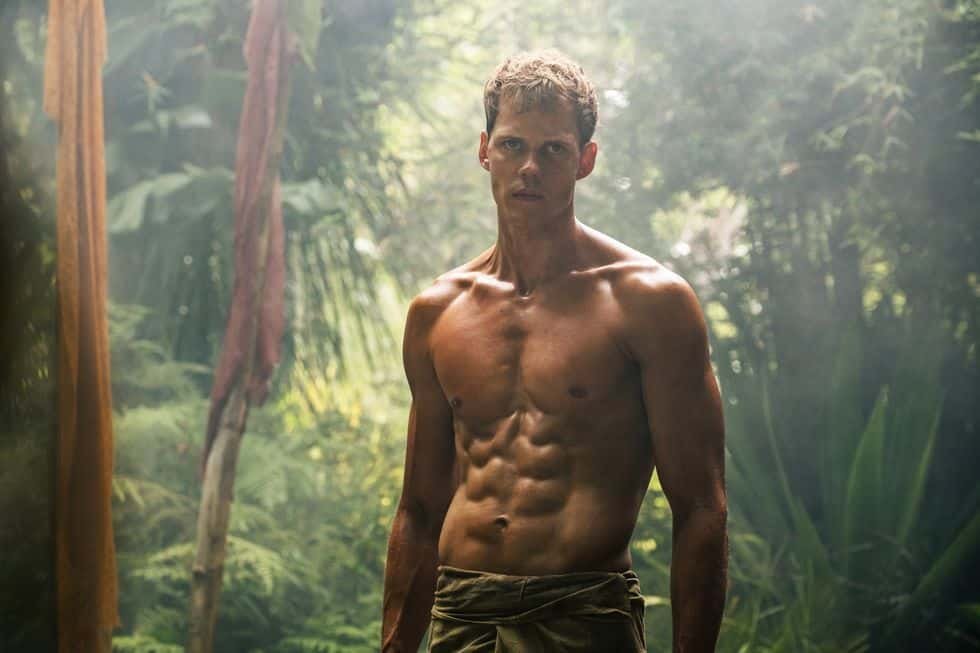
Dystopian cinema – often based on dystopian literature – sometimes likes to centre itself around a special event of some kind. A TV show, perhaps. A day where conventional law goes out of the window. A special competition, or spectacle of some kind – or, if you’re the screenwriters behind Boy Kills World, maybe a little of all of those things. How come, then, that with so much ostensibly going on, that the world-building here feels like so much of an afterthought? Whilst there is likely enough fighting here to satisfy fans of…fighting, anyone else might find themselves labouring through nigh-on two hours of limited characterisation, setting and thematics.
As the opening credits roll a voiceover – not the film’s star, Bill Skarsgård, but H. John Benjamin – quickly fills us in on the world of the film. We get, in quick succession, the information that there’s been a violent overthrow of the political system by a ruling family, the Van Der Koys, and that these Van Der Koys keep their autocracy spick and span by having a special yearly event where they kill a number of dissidents on telly. Our narrator loses his family – his mother and sister – this way, but he escapes the melee to train as a fighter in the woods, under the watchful eye of a ‘shaman’ (Yayan Ruhian). It’s a little Karate Kid, a little Jaqen H’ghar. The main character – never named – progresses well, but he misses his family, particularly his little sister. All he can do is train, train, train. As he reaches adulthood (via a nice segue as Skarsgård appears to shake hands with his former self), preparations for the incoming grand vengeance epic begin to form in his mind.
Things move on quicker than planned when the Boy is running errands in a nearby town: wouldn’t you know it, but it’s the day of the Grand Culling on this particular day, and the Boy finds himself witness to the unpleasantries of the selection process. Even before he gets involved, things go badly wrong when there’s an accidental shooting: the Van Der Koy goons restore order, but the Boy has both learned a few things, and remembered a few, too. So we’re off: it turns out that today is as good a day as any to track down the baddies who destroyed his family. With the help of a handful of other dissidents, he’s off to find the matriarch, Hilda Van Der Koy (Famke Janssen).
There are good traits in this film, such as its best moments of sending itself up – and by extension, sending up the more serious genre films which operate along similar lines. Skarsgård does a decent job with a challenging role, being both very physical, and non-verbal: however, you might question the latter. He’s been written as a Deaf character who doesn’t speak, despite being a lip-reader; this leads to a sometimes strained and sometimes irritating use of the voiceover as the Boy’s own, unspoken voice, which unfolds in real time and can be heard by some characters in the film: so it’s sort of spoken, sometimes. This motif doesn’t bear much scrutiny, and can feel very thin.
As some of the film’s issues aggregate, it causes some insurmountable problems. For example, some of the film’s little asides and ideas can’t bear the amount of repetition which they get; the appearance and reappearance of the sister, for example, though no doubt intended to evidence the Boy’s complex inner world and tragic backstory, feels like a distraction as things tick on, as much as Quinn Copeland as Mina is a charming presence on screen in her own right. Given the film’s length, this kind of recurrence feels tantalisingly like something which could have been cut. Less is more. That goes for the sheer amount of time it spends sending itself up, too: a joke rarely bears much retelling. And for all that, the tone – which begins well, jogging along quite lightly – lurches and shifts in places, with events becoming increasingly heavy and unpleasant. Perhaps the film simply wants to be too many things.
Its increasingly protracted problems are no doubt exacerbated by choosing a dystopian setting which barely emerges from the murk. The budget, which is no doubt mostly focused on the fight scenes, strains when it gets anywhere near the scale and complexity needed to create a convincing framework. It’s giving The Hunger Games with its corrupt ruling family and gathered masses, but we lack for the kinds of numbers, the kinds of spectacles, which the film suggests are there, Hunger Games-like, in the background. A rule of thumb: don’t borrow what you can’t pay back. And when you can’t do scale, then you need great details, but Boy Kills World doesn’t have these either – it’s always fighting against what it wants, or needs to do, cutting corners in some places to fixate on its own self-selected quirks somewhere else. There may be just enough OTT violence here for fans of that, and people who like those old Far Eastern revenge flicks will see some pleasing moments of parity here, but for the rest of us, Boy Kills World contains way too many irritations to fully land its punches.
Boy Kills World (2023) is available now.
